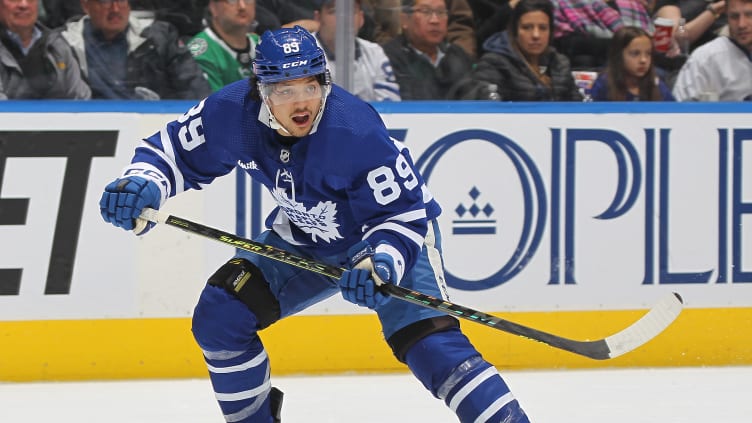
The last few seasons have been challenging for Nick Robertson, the young winger for the Toronto Maple Leafs. Despite his clear talent and scoring prowess, Robertson has struggled with inconsistent playing time, frequent demotions, and injuries. Given these issues, it’s understandable that he might feel undervalued by the team.
Robertson, who had early success in junior leagues and worked hard to join the NHL, has seen his career interrupted by this frustrating cycle between the NHL and the AHL. Despite showing promise when healthy, he’s often been sent back to the minor leagues. This ongoing situation is disheartening, and Robertson has reached a point where he’s ready to seek opportunities with a different organization.
He’s not concerned with whether the Maple Leafs get good value in a trade; in his view, they’ve consistently undervalued him, which has been evident throughout his career. Robertson is now at a pivotal moment, facing a choice between staying with the team that he feels has not appreciated him or moving on to find a new opportunity.
Robertson’s frustration is understandable. Last season, which was his first healthy one in a while, he managed to score 14 goals in 56 games with only 11 minutes of ice time per game. His scoring rate at even strength was second only to Auston Matthews. It’s natural for him to wonder how much more he could have achieved with additional ice time. Despite his performance, he found himself back in the AHL, which felt like a significant setback.
Recent fan reactions to Robertson’s trade request indicate a lack of sympathy from many Maple Leafs supporters. However, from a broader perspective, it’s clear that feeling undervalued is a tough experience for anyone. This feeling can undermine confidence and motivation, especially for an NHL player who knows they have the talent to succeed but isn’t given the chance to prove it.
Robertson has been vocal about his dissatisfaction with his situation. Last season, he hinted at his desire for more consistent playing time, and this offseason, he has formally requested a trade out of Toronto.
As the new season approaches and Robertson remains unsigned, he faces a crucial decision. The Maple Leafs could potentially withhold a contract or playing time out of spite, which would only reinforce Robertson’s feelings of being undervalued.
Nonetheless, there are reasons for Robertson to consider staying in Toronto. With significant changes happening, including the hiring of a new head coach, Craig Berube, who may alter team dynamics and player roles, there could be new opportunities for Robertson. Additionally, Tyler Bertuzzi’s departure from the team leaves a vacancy on the left wing that Robertson could potentially fill.
If Robertson decides to stay, he could frame his choice as a strategic move to capitalize on the team’s changes. By demonstrating his willingness to adapt and overcome past challenges, he could use this opportunity to reshape his image from being undervalued to being a resilient player who has proven his worth. Success in this scenario would boost his reputation and highlight his professionalism and strength.
On the other hand, Robertson might believe that moving to a new team is his best option for advancement. Staying in Toronto could result in more frustration if he continues to face limited playing time. By seeking a new team, Robertson could find an organization ready to offer him a consistent role in the NHL, where he can regularly showcase his skills. As someone from Southern California, the San Jose Sharks might seem particularly appealing.
Choosing to leave could also be seen as a principled decision, reflecting his commitment to achieving his full potential. A fresh start might provide him with the stability and support necessary for success in a new environment.
Robertson’s situation is sensitive. Even if he considers staying, he may worry about appearing weak or submissive to the Maple Leafs, who he feels have not treated him well. Nevertheless, there are ways for him to maintain his dignity and professionalism if he decides to remain with the team.
If Robertson decides to stay, he could present his decision as a response to the positive changes within the organization under new leadership and coaching. This approach would frame his choice as a strategic move, demonstrating his dedication to personal and professional growth. By embracing the opportunity to thrive in this renewed environment, he would show that he’s not retreating but rather seizing a chance to excel.
Conversely, if Robertson opts to leave, he could justify it as a crucial step for his career. Emphasizing that he’s making a choice for his long-term development, he can portray himself as a player who understands his value and is willing to make difficult decisions to achieve his full potential. Robertson’s Critical Career Decision
Robertson’s Critical Career Decision
Regardless of his choice, Robertson’s key task will be to manage the narrative surrounding his decision. He needs to ensure that his choice is viewed as a professional and calculated move rather than an emotional response. This strategy will help him safeguard his reputation and lay the groundwork for future success, whether in Toronto or with a new team.
As Robertson faces this pivotal moment, it will be fascinating to see which path he takes. This decision is significant and will likely become a defining moment in his career.
Leave a Reply